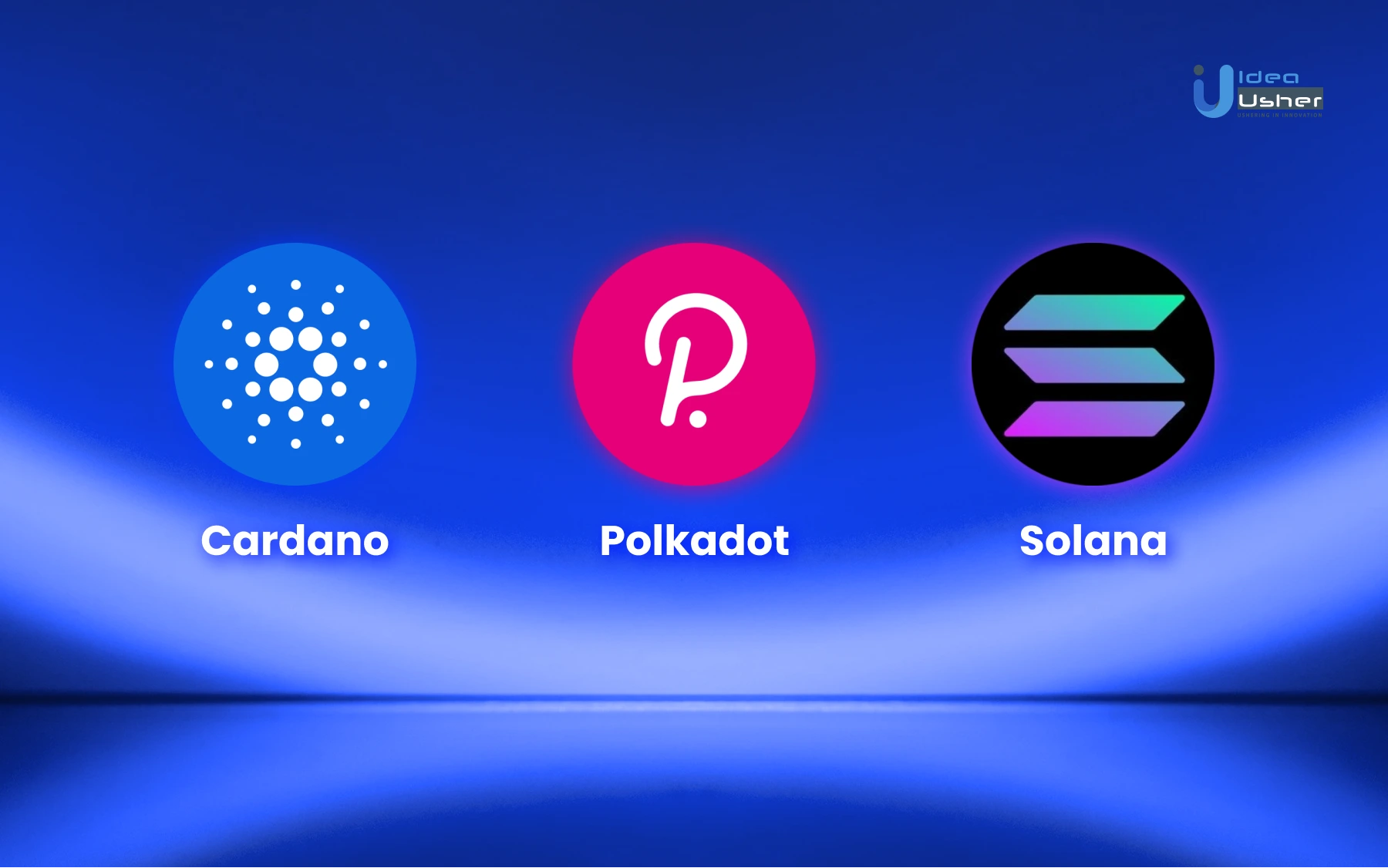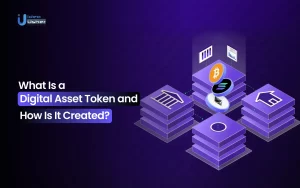Are you stuck between choosing Cardano vs Polkadot vs Solana blockchain for your business?
According to the block data: “81 of the top 100 public companies are using blockchain technology.“
Due to blockchain’s multiple benefits, such as greater privacy and security, many businesses are shifting towards blockchain technology.
However, each blockchain offers different benefits which may or may not be suitable for every project.
So, how do you choose the perfect blockchain for your business?
For that, you must understand the key differences between these three famous blockchains: Polkadot, Solana, and Cardano.
In this blog, we have compared all these blockchains to help you select the best one for your business.
What is Cardano?
Cardano is a very popular blockchain for its suitability for running smart contracts. This blockchain allows developers to develop a wide range of decentralized finance apps, crypto games, new crypto tokens, and much more.
The primary intent for making Cardano was to provide a blockchain platform that is secure, fast, energy-efficient, energy efficient, and robust.
Cardano Blockchain has its native cryptocurrency, known as ADA, which can be used to send and receive payments.
Pros & Cons
The pros and cons of Polkadot are given as follows:
| Pros | Cons |
| Great development team | Not developed on the full scale yet |
| Tested various protocols during development to enable high efficiency | Supports on-chain voting that can limit the upgradation of Cardano |
| Uses multiple layers, such as the settlement layer, and computational layer | 75% of all ADA tokens are already staked (few staking opportunities) |
| Open source platform | |
| Highly secure due to proof of stake(PoS) protocol |
However, to find whether Cardano is suitable for your blockchain projects, you can compare your project requirements and features with the top apps available on Cardano.
Top Cardano projects to look out for:
- MinSwap (MIN)
- Ardana (DANA)
- Empowa (EMP)
- Revuto (REVU)
- Djed (DJED)
- MELD (MELD)
- Cornucopias (COPI)
What makes the Cardano best?
- Cardano aims to provide a platform suitable for decentralized applications (DApps) development by delivering a multi-asset ledger and smart contracts.
- Cardano runs on the Proof-of-Stake(PoS) Ouroboros consensus protocol, offering a great level of decentralization.
What is Polkadot?
Polkadot is a protocol that connects unrelated blockchains to allow them to interact with each other so they can exchange data. The next aim for creating Polkadot is to design a protocol that uses parallel blockchains that are fast and highly scalable.
Polkadot also offers its exclusive tokens known as “DOT” to its members that perform staking on the network of Polkadot. Their network consists of the leading “relay blockchain.”
Also, the blockchain consists of a connecting layer known as a “bridge” that allows the exchange of data and values between blockchains supported on their network.
Pros & Cons
The pros and cons of Polkadot are as follows:
| Pros | Cons |
| Offers flexibility to developers to build an application on their blockchain | Hackers have already hacked the Polkadot platform twice, making the blockchain suffers millions of dollars of loss. |
| Allows developers to launch chains and applications, offering them a shared security model | A limited number of parachains are available. |
| The blockchain has already raised $200 million, making it listed under the top 10 coins by market cap. | |
| Polkadot supports the integration of external blockchains such as Bitcoin and Ethereum. |
Check out the best project available on Polkadot to match their features with your project requirements:
- PolkaBTC
- Polkaswap
- Bridge Mutual
- RioChain
- Acala
- KILT
- Edgeware
- Polka Starter
- Kusama
- Moonbeam
What makes the Polkadot best?
- Network overload is less likely when transactions are completed in numerous lanes.
- Polkadot uses parachains and a relay chain that helps the Polkadot to boost its scalability.
- Polkadot’s bridges allow different blockchain networks to interact with each other.
What is Solana?
Solana is another best blockchain networks for building and running crypto applications. Solana supports Proof of History(PoH), a blockchain network’s cryptography solution for tracking timestamps.
Like other blockchains, Solana also has its native cryptocurrency, SOL, which is suitable for building and executing smart contracts.
Pros & Cons
Check the pros and cons of Solana:
| Pros | Cons |
| High transaction speed upto 50K per second | High hardware cost to set up Solana |
| Extreme low fees for app scaling | Low level of decentralization |
| High level of scalability due to its proof of stake model | All the promised features are not implemented yet |
| Energy efficient, 1.6 million more environments friendly than Bitcoin | Less decentralized apps are available |
Here are the most popular projects available on the Solana blockchain:
- Step Finance
- Star Atlas
- Orca
- Phantom
- MetaSafari
- Solanart
- Saber
What makes the Solana best?
- Solana is suitable for hosting highly scalable decentralized applications
- It has more incredible transaction speed and lowers transaction fees
- This blockchain is based on a Proof-of-Stake (POS) blockchain that uses a new technology known as Proof of History (PoH)
Check out how these blockchains are different from each other by comparing the following factors.
Cardano Vs Polkadot Vs. Solana: what’s the difference?
Let’s compare the few factors between these blockchains to find a noticeable difference:
| Cardano | Polkadot | Solana | |
| Transaction per second | 270 | 1000 | 65000 |
| Avg fee per transaction | $0.25 | $1 | $0.00015 |
| Transaction latency | 10 min | 2 min | 0.4 sec |
| Number of validators | 2376 | 297 | 702 |
| Total transactions | 5.9 Billion | 1.7 Million | 15 Billion |
Now, let’s compare each blockchain one on one to help you decide what to pick based on your project requirement.
Cardano Vs. Polkadot
The Cardano blockchain is known for offering a high level of decentralization, while Polkadot is known for offering interoperability by allowing developers to connect multiple blockchains on the same platform.
Polkadot has great transaction speed and low latency, while Cardano has economical transaction fees.
Cardano Vs. Solana
Compared to Cardano, Solana has an excellent ecosystem for application development. However, Cardano offers a greater level of decentralization compared to Solana due to its stake pool mechanism.
Solana offers great transaction speed and low latency and fees as compared to Cardano.
So if you want a great development environment, you should consider Solana. In case you prefer a high level of decentralization, then choosing Cardano would be your best option.
Polkadot Vs. Solana
Solana aims to offer both scalability and development capability.
While the development of Polka Dot was started to fulfill the ambition of providing a platform that facilitates interoperability between multiple blockchains.
Polkadot offers interoperability by allowing developers to send data between different blockchain networks safely and seamlessly.
After discussing the clear difference between Cardano vs. Polkadot vs. Solana blockchain, let’s check which one you should pick.
So, which blockchain should I pick?
Choosing the right blockchain among Cardano, Polkadot, and Solana is fairly a tough choice. It entirely depends on the kind of project and its requirements.
Each blockchain has its benefits and drawbacks, which you must be aware of while choosing your business. Therefore, choosing the most suitable blockchain is necessary for having fruitful results for your business.
But if this choosing and picking become overwhelming for you, better connect with the experts in the field. Experienced app development companies such as Idea Usher are your go-to platform where you will find proficient blockchain experts sorting the selection process for your business.
Also, the team can help build your application on a suitable blockchain platform starting from scratch.
Contact Idea Usher:
Email:
Phone:
Build Better Solutions With Idea Usher
Professionals
Projects
FAQ
Q. What is so good about Polkadot?
Here are the advantages of the Polkadot blockchain
- Flexibility in blockchain application development
- The shared security model for chain launch
- High market cap of around $200 M
- Supports integration of external blockchain
Q. What makes Cardano unique?
These are the few unique points about Cardano
- The great development team behind the Cardano
- High efficiency as it has tested multiple protocols
- Use settlement, and computational layer
- Open source platform
- Uses Proof of Stake(PoS) protocol
Q. What makes Cardano better than Solana?
Cardano is better than Solana for the following reasons:
- Cardano has a large number of total validators
- It uses two-layered architecture
- Cardano has a high level of decentralization compared to Solana

























